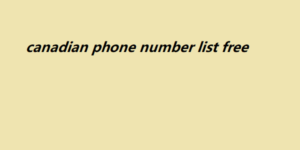Grounds for Patent Invalidity Prior Art and Challenges
Posted: Wed Dec 18, 2024 8:56 am
Originality and Obscurity Prior art includes any information made available to the public in any form before the patent application date that may be relevant to the patent's claims regarding novelty and non-obviousness. If it can be shown that prior art discloses the same invention or makes it obvious to a person skilled in the art, the patent can be invalidated on those grounds. Public Use or Sale Before Patent Application If the invention was used publicly or sold before the patent application was filed, it may not meet the novelty requirement. The critical period is one year before the application date in the US, known as the “grace period.
” Insufficient Disclosure/Enablement A patent must fully disclose the invention in such detail that a person skilled in the relevant field can make and use the invention. Failure to meet this requirement of adequate canadian phone number list free disclosure or enabling may result in invalidation, as the patent does not sufficiently contribute to public knowledge.

Double Patenting This occurs when an inventor attempts to patent the same invention more than once or patents that are not distinctively different from each other. Double patenting can result in invalidation to prevent unfair extension of patent protection beyond the statutory term. Alternative Strategies for Patent Non-Collection Inventor's Oath In patent law, an individual who is identified as the inventor has contributed in some way to the invention specified in a claim.
” Insufficient Disclosure/Enablement A patent must fully disclose the invention in such detail that a person skilled in the relevant field can make and use the invention. Failure to meet this requirement of adequate canadian phone number list free disclosure or enabling may result in invalidation, as the patent does not sufficiently contribute to public knowledge.

Double Patenting This occurs when an inventor attempts to patent the same invention more than once or patents that are not distinctively different from each other. Double patenting can result in invalidation to prevent unfair extension of patent protection beyond the statutory term. Alternative Strategies for Patent Non-Collection Inventor's Oath In patent law, an individual who is identified as the inventor has contributed in some way to the invention specified in a claim.